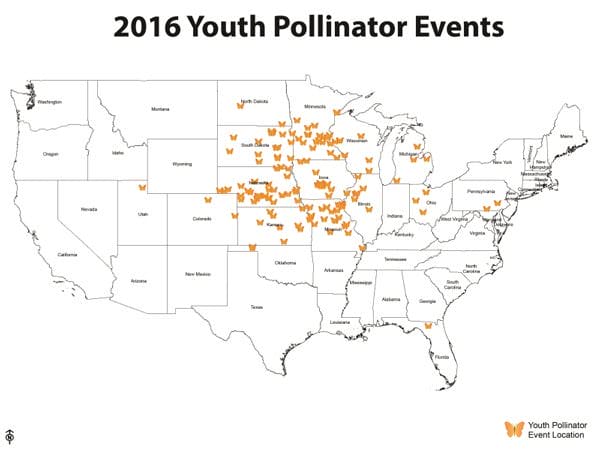
ST. PAUL, Minn. -(Ammoland.com)- Coinciding with National Pollinator Week on June 19th – 25th, Pheasants Forever & Quail Forever is celebrating its 2016 efforts to support diverse wildlife habitat for the future of pollinators and upland gamebirds.
The organization’s signature Youth Pollinator Habitat Program engaged more than 8,000 participants last year to establish 209 acres of pollinator habitat throughout pheasant and quail ranges in the United States.
“The Youth Pollinator Habitat Program is raising awareness of decreasing honey bee and monarch butterfly populations while providing quality nesting and foraging habitat that pollinators and other wildlife rely on for survival,” stated Drew Larsen, habitat education programs manager for Pheasants Forever & Quail Forever. “This education and outreach initiative continues to show dramatic growth each year due to the generous support of our sponsors.”
The program’s objectives are to increase awareness about declining grassland wildlife populations (including pheasants, quail, and pollinating insects), educate the general public on the importance of pollinator habitat, and establish quality pollinator habitat across the country.
Local Pheasants Forever chapters and their partners are working with communities to create habitat projects that involve youth, school, and community groups.
Pollinator habitat necessary for rapidly declining populations of honey bees and monarch butterflies is also the very same diverse grassland and prairie flower habitat necessary for pheasants, quail, and a host of other wildlife species – Pheasants Forever & Quail Forever has taken a lead role among conservation groups nationwide to promote this specific habitat variety.
2016 Youth Pollinator Habitat Program Achievements
Pheasants Forever & Quail Forever’s Youth Habitat Pollinator Program is made possible by funding support from DuPont Pioneer, Bayer Bee Care, Cabela’s Outdoor Fund, Nebraska Environmental Trust, MN Environment and Natural Resources Trust Fund, ND Outdoor Heritage Fund, and the University of Nebraska.
- Projects Implemented: 94
- Acres Impacted: 209
- Youth Participants: 6,863
- Adult Participants: 1,445
- Volunteer Hours: 12,077
- Grant Funding: $92,231.32
- Chapter Funding: $98,408.78
- In-Kind Contributions: $242,292.50
- Total Program Funding: $432,932.60
In addition to the Youth Pollinator Habitat Program, Pheasants Forever & Quail Forever planted over 326 million milkweed seeds in 2016 to enhance the overall quality of upland habitat in the United States while providing a critical resource for pollinators and other wildlife.
This number is expected to grow exponentially with the continued development of an innovative partnership – the Bee & Butterfly Habitat Fund – that will be a frontrunner for national efforts to restore pollinator habitat. The organization is aiming to surpass one billion milkweed stems established by 2020, helping to deliver the goals set forth by the National Pollinator Action Plan.
For more information about Pheasants Forever and Quail Forever’s Youth Pollinator Habitat Program, contact Drew Larsen at [email protected] or 308-293-1194.
About Pheasants Forever:
Pheasants Forever, including its quail conservation division, Quail Forever, is the nation’s largest nonprofit organization dedicated to upland habitat conservation. Pheasants Forever and Quail Forever have more than 149,000 members and over 700 local chapters across the United States and Canada. Chapters are empowered to determine how 100 percent of their locally raised conservation funds are spent; the only national conservation organization that operates through this truly grassroots structure. Since creation in 1982, Pheasants Forever has spent $708 million on 517,464 habitat projects benefiting 15.81 million acres nationwide.



This is GREAT,THANK YOU’S,pollinators provide us with a 1/3 of our food.